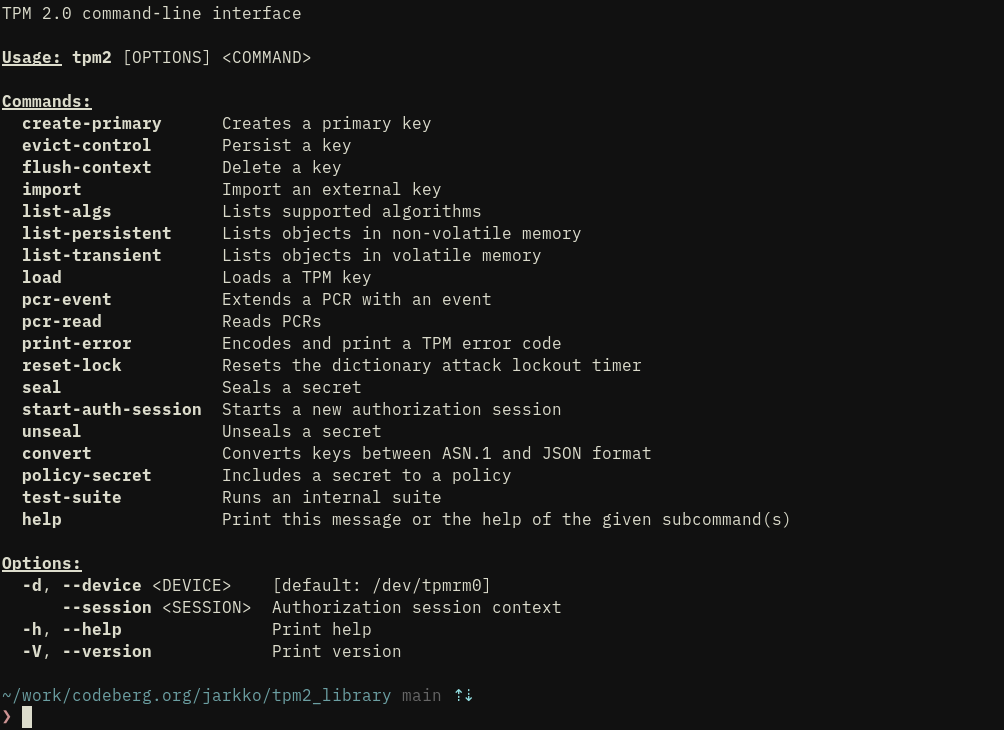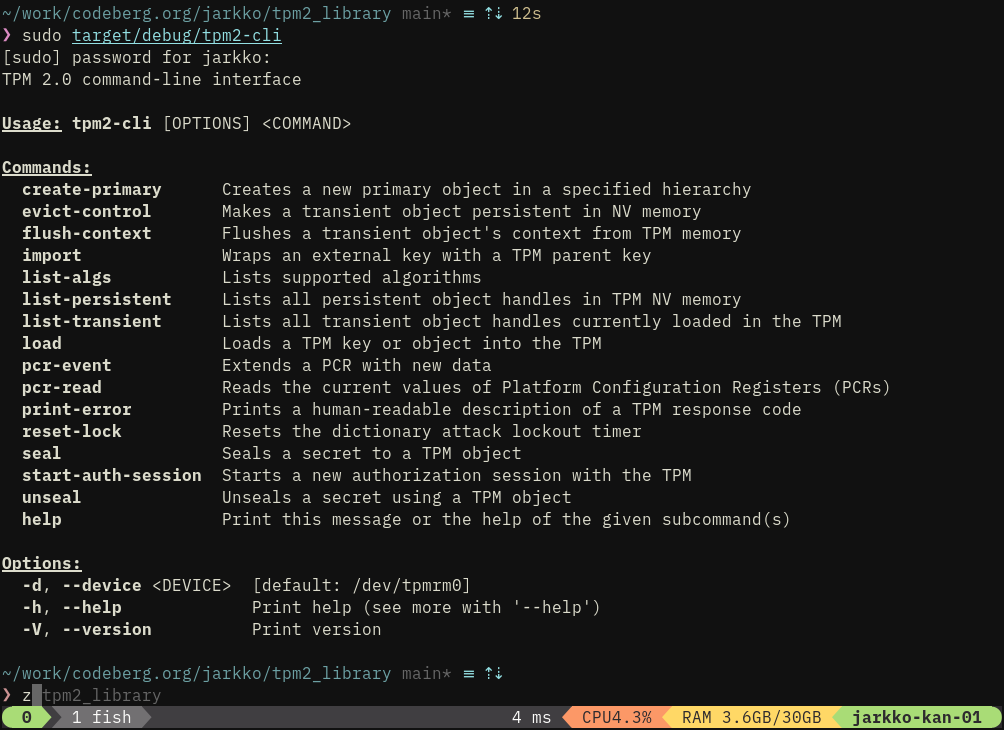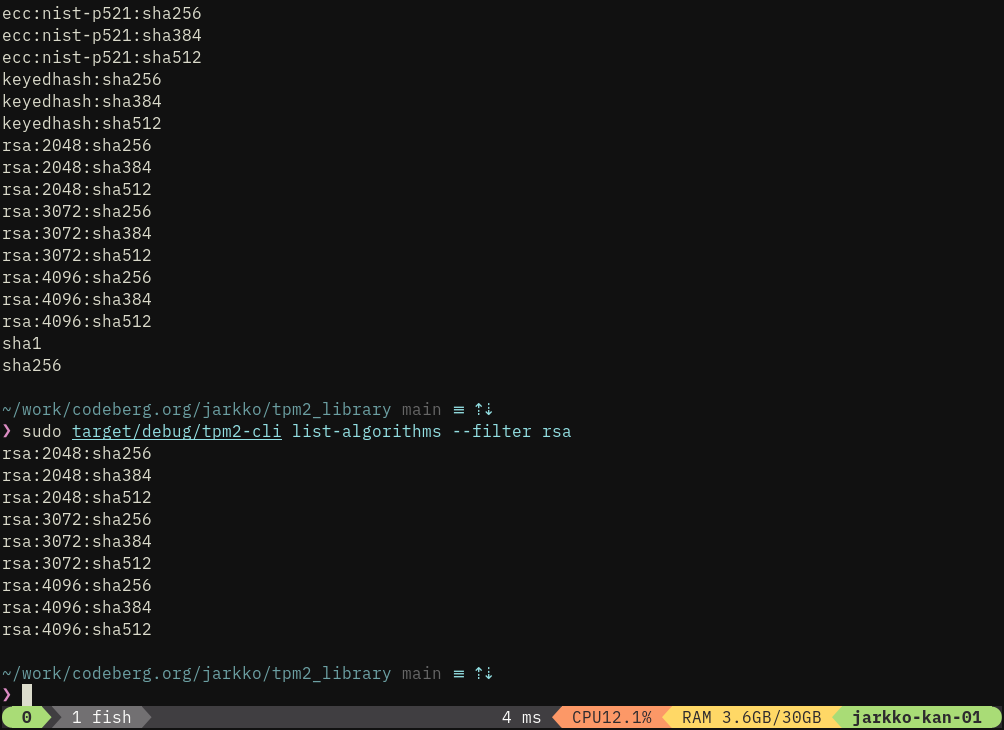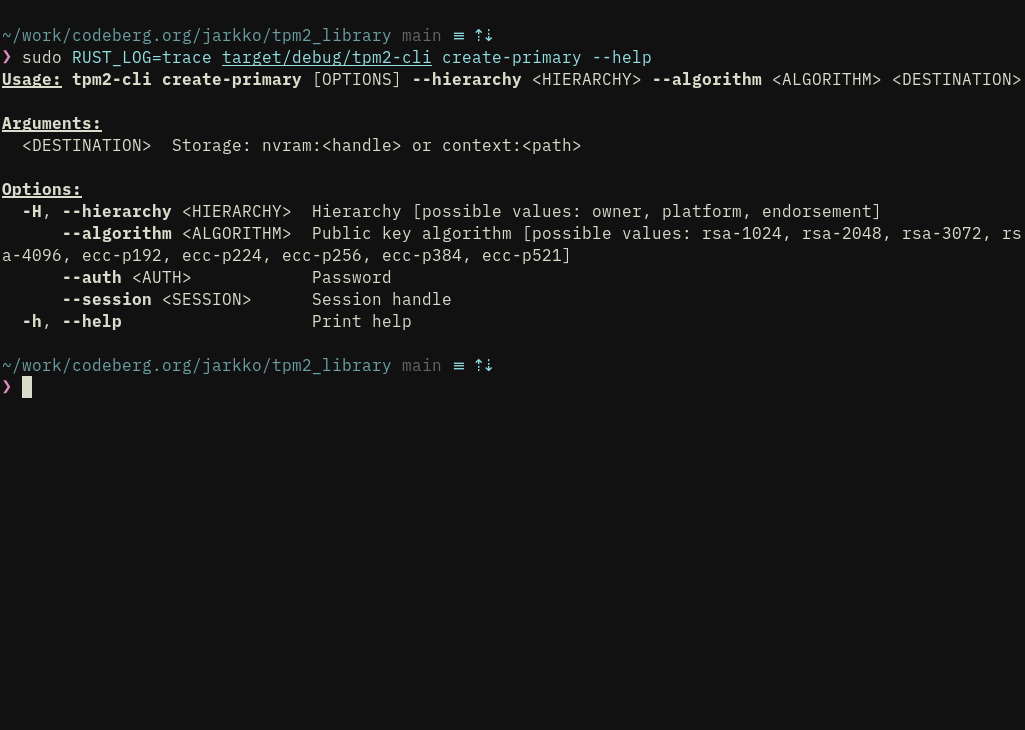Posts
4782Following
319Followers
489OpenPGP: 3AB05486C7752FE1
Jarkko Sakkinen
jarkkoThis makes me happy:
tpm_struct!(
#[derive(Debug, PartialEq, Eq, Clone)]
TpmPcrEventCommand,
TpmCc::PcrEvent,
TpmSt::Sessions,
1,
{
pub event_data: Tpm2b,
}
);
tpm_response!(
#[derive(Debug, Default, PartialEq, Eq, Clone)]
TpmPcrEventResponse,
TpmCc::PcrEvent,
TpmSt::Sessions,
{
pub digests: TpmlDigestValues,
}
);
Also the types inside use the same system (in fact tpm_struct is shared macro with data types and commands). This will generate full parsing and building for both commands and responses - all without heap involved.
Jarkko Sakkinen
jarkkoE.g., policy-secret is placeholder. it would much nicer to have "policy [--train] <expression>" with some combinatorial language.
It could take advantage of object references provided my baked-in stack machine:
1. Subcommands a take list of JSON objects from stdin and consume as many as they need from top of te stack.
2. Each subcommand then produce results to the top.
Of course some things come through arguments (e.g. for key creation I have "--persistent").
Also perhaps load and import should be combined to a single smart command. The point is that this is where I don't know what to do exactly and changes for cli interface are welcome :-) I'm now happy that I got allocs and panics away from protocol crate making it "linux-rust ready".
In the protocol crate itself there is one single puzzle where constant improvement makes sense both in kernel and user space: narrowing the delta between "SIZE" and "len()" of TpmSize trait. Ideally the delta would be zero t some point. To be usable in kernel I've now reach that goal (easily) but optimizing this equation makes it substantially better.
Jarkko Sakkinen
jarkkoJarkko Sakkinen
jarkkoit started as a framework of structs, and it turned into framework generating a framework of structs from a protocol description :-)
Jarkko Sakkinen
jarkkopreparation release to upgrade rzm and szm to something that could be considered nicer than rz and sz.
Jarkko Sakkinen
jarkkoIt should demonstrate the unipolarity quite well and also possibilities to use the crate as interoperability layer for alt keystores.
It's quite maintainable as I've developed a domain language for declaratively describing TCG specification:
❯ git grep macro_rules
protocol/src/command/util.rs:macro_rules! tpm_message {
protocol/src/command/util.rs:macro_rules! tpm_response_with_params {
protocol/src/command/util.rs:macro_rules! tpm_dispatch {
protocol/src/command/util.rs: macro_rules! tpm_command_parser {
protocol/src/command/util.rs: macro_rules! tpm_response_parser {
protocol/src/lib.rs:macro_rules! tpm_handle {
protocol/src/lib.rs:macro_rules! tpm_bitflags {
protocol/src/lib.rs:macro_rules! tpm_enum {
protocol/src/lib.rs:macro_rules! tpm_integer {
protocol/src/structure/mod.rs:macro_rules! tpm_struct {
protocol/src/structure/tpm2b.rs:macro_rules! tpm2b {
protocol/src/structure/tpml.rs:macro_rules! tpml {
I've produced now 5K SLOC of non-boilerplate code since I got the inspiration last Sunday (with not much sleep), and total size of crate is about 6K SLOC making it my largest Rust project so far written single-handidly :-) It was kind of effort that if you don't just push it through it never will be finished.
#linux #tpm
Jarkko Sakkinen
jarkkoJust stands out from the crowd somehow so had to let ths out :-)
Jarkko Sakkinen
jarkkoWhen it starts to be easy to combine the subcommands in script this should be in fairly good state.
Import and load support keys in ASN.1 format, which is used by kernel for loading trusted keys. Software crypto for now is with libssl bindings as it is sort for safe-play for crypto (CVEs, security hotfixes, auditing) and also it is what I'm most used to in kernel development (and that is what I ultimately care about).
Jarkko Sakkinen
jarkkoThis is how I declare command bodies now in the implementation:
tpm_command!(
TpmStartAuthSessionCommand,
TpmCc::StartAuthSession,
TpmSt::NoSessions,
2,
pub nonce_caller: Tpm2b,
pub encrypted_salt: Tpm2b,
pub session_type: TpmSe,
pub symmetric: TpmtSymDefObject,
pub auth_hash: TpmAlgId,
);
[2 is in fact number handles]
This will generate the command and implement traits for marshalling AND unmarshalling command. Both are implemented in-depth for all TCG specification types across the board.
Another simpler example is TPML_* from the specification:
tpml!(TpmlAlgProperty, TpmsAlgProperty);
tpml!(TpmlDigest, Tpm2b);
tpml!(TpmlDigestValues, TpmtHa);
tpml!(TpmlHandle, u32);
tpml!(TpmlPcrSelection, TpmsPcrSelection);
And TPM2B_*:
tpm2b!(full; Tpm2bAttest, TpmsAttest);
tpm2b!(full; Tpm2bContextData, TpmsContextData);
tpm2b!(full; Tpm2bCreationData, TpmsCreationData);
tpm2b!(full; Tpm2bEccPoint, TpmsEccPoint);
tpm2b!(full; Tpm2bEncryptedSecret, TpmuEncryptedSecret);
tpm2b!(full; Tpm2bIdObject, TpmsIdObject);
tpm2b!(full; Tpm2bNvPublic, TpmsNvPublic);
tpm2b!(full; Tpm2bSensitive, TpmtSensitive);
tpm2b!(full; Tpm2bTemplate, TpmtPublic);
I find this really fascinating :-)
#rust #rustlang #linux #kernel #tpm
Jarkko Sakkinen
jarkkoit's about 5k of rust code but large portion of that is just architectural types.
the first problem is the hardest: what to call the new at this point still imaginary device :-)
it's a post initcall use case just like /dev/tpmrm0 e..g, use by systemd (afaik tbh have not checked) where as hardware interfacing stuff would be tedious given tight bindings to to the boot. thus, it is not extremely hard to implement in linux-rust as long as the device can turn on before PID 1.
benefits could be e.g., to simplify TPM code in daemons such as systemd, if the resource manager would do a better job servicing their requirements.
#linux #tpm #rust #rustlang
Jarkko Sakkinen
jarkkoSome other idioms are context: and nvram: as sinks for output.
Jarkko Sakkinen
jarkkoJarkko Sakkinen
jarkkopub trait Command<'a>: Marshal + Unmarshal<'a> {
const COMMAND_CODE: TpmCc;
const COMMAND_TAG: TpmSt;
}
pub trait Response<'a>: Marshal + Unmarshal<'a> {
const COMMAND_CODE: TpmCc;
const COMMAND_TAG: TpmSt;
}
Jarkko Sakkinen
jarkko1. It's a no_std crate that uses Rust's type system describe TPM commands and responses in the same resolution as the spec.
2. It marshals also responses and unmarshals commands.
3. It's not a stack. it's stackless implementation of types.
These properties allow to nest and glue it to TSS2 and any other pre-existing TPM stack.
Also it could be theoretically used to implement a chip since it is designed to run also bare metal and has been designed to be skimpy on resources ;-)
Hopefully next week get this out...
Jarkko Sakkinen
jarkko```
creation_ticket.rs
mod.rs
tpm2b_public.rs
tpm2b.rs
tpm2b_sensitive_create.rs
tpm_alg_id.rs
tpma_object.rs
tpma_session.rs
tpm_cap.rs
tpm_cc.rs
tpm_ecc_curve.rs
tpml_digest.rs
tpml_digest_values.rs
tpml_pcr_selection.rs
tpm_rc.rs
tpm_rh.rs
tpms_auth_command.rs
tpms_auth_response.rs
tpms_context.rs
tpms_ecc_point.rs
tpm_se.rs
tpms_keyedhash_parms.rs
tpms_pcr_selection.rs
tpms_pcr_select.rs
tpms_sensitive_create.rs
tpms_symcipher_parms.rs
tpm_st.rs
tpmt_ha.rs
tpmt_kdf_scheme.rs
tpmt_public.rs
tpmt_scheme.rs
tpmt_sym_def_object.rs
tpmu_ha.rs
tpmu_public_id.rs
tpmu_public_parms.rs
```
This is horribly slow process as first because it is not as mechanical process one might think. There's lot of scattered per-type quirks. But as this grows this becomes less and less of pain :-)
I define "completed" status for every type that they must serialize and deserialize, which creates constraints that make them feasible for mock testing for instance.
Jarkko Sakkinen
jarkko❯ sudo RUST_LOG=trace target/debug/tpm2-cli create-primary -H owner ecc --curve nist-p256
2025-08-05T07:51:22.223171Z DEBUG tpm2_cli::tpm: Opening device: /dev/tpmrm0
2025-08-05T07:51:22.223258Z TRACE tpm2_cli::tpm: Command:
2025-08-05T07:51:22.223283Z TRACE tpm2_cli::tpm: 0000: 80 02 00 00 00 43 00 00 01 31 40 00 00 01 00 00
2025-08-05T07:51:22.223298Z TRACE tpm2_cli::tpm: 0010: 00 09 40 00 00 09 00 00 00 00 00 00 04 00 00 00
2025-08-05T07:51:22.223310Z TRACE tpm2_cli::tpm: 0020: 00 00 1a 00 23 00 0b 00 03 00 72 00 00 00 06 00
2025-08-05T07:51:22.223326Z TRACE tpm2_cli::tpm: 0030: 80 00 43 00 10 00 03 00 10 00 00 00 00 00 00 00
2025-08-05T07:51:22.223335Z TRACE tpm2_cli::tpm: 0040: 00 00 00
2025-08-05T07:51:22.467218Z TRACE tpm2_cli::tpm: Response Header:
2025-08-05T07:51:22.467308Z TRACE tpm2_cli::tpm: 0000: 80 02 00 00 01 1a 00 00 00 00
2025-08-05T07:51:22.467332Z TRACE tpm2_cli::tpm: Response Body:
2025-08-05T07:51:22.467363Z TRACE tpm2_cli::tpm: 0000: 80 ff ff ff 00 00 01 03 00 5a 00 23 00 0b 00 03
2025-08-05T07:51:22.467393Z TRACE tpm2_cli::tpm: 0010: 00 72 00 00 00 06 00 80 00 43 00 10 00 03 00 10
2025-08-05T07:51:22.467421Z TRACE tpm2_cli::tpm: 0020: 00 20 a7 a6 81 0c 1c 1e 49 00 6f 24 69 12 22 e5
2025-08-05T07:51:22.467455Z TRACE tpm2_cli::tpm: 0030: af 6f 2a 47 65 ed 8e 68 4a 9f 16 e9 03 db 5a 42
2025-08-05T07:51:22.467485Z TRACE tpm2_cli::tpm: 0040: 5c 0a 00 20 57 7c e3 94 59 4c ab 5b 46 49 32 9a
2025-08-05T07:51:22.467516Z TRACE tpm2_cli::tpm: 0050: be 04 e9 9e 8f 21 6d 3d 86 53 42 c3 48 20 40 dd
2025-08-05T07:51:22.467545Z TRACE tpm2_cli::tpm: 0060: fc 83 95 f2 00 37 00 00 00 00 00 20 e3 b0 c4 42
2025-08-05T07:51:22.467572Z TRACE tpm2_cli::tpm: 0070: 98 fc 1c 14 9a fb f4 c8 99 6f b9 24 27 ae 41 e4
2025-08-05T07:51:22.467600Z TRACE tpm2_cli::tpm: 0080: 64 9b 93 4c a4 95 99 1b 78 52 b8 55 01 00 10 00
2025-08-05T07:51:22.467631Z TRACE tpm2_cli::tpm: 0090: 04 40 00 00 01 00 04 40 00 00 01 00 00 00 20 5d
2025-08-05T07:51:22.467661Z TRACE tpm2_cli::tpm: 00a0: a0 41 ba c0 ee 31 35 ae bb 0c ad fb a4 97 c6 a1
2025-08-05T07:51:22.467690Z TRACE tpm2_cli::tpm: 00b0: 87 7f ae 83 2d d3 d1 f8 f7 a8 71 b8 25 e8 54 80
2025-08-05T07:51:22.467720Z TRACE tpm2_cli::tpm: 00c0: 21 40 00 00 01 00 20 52 97 3a e0 e3 f0 a2 4e a3
2025-08-05T07:51:22.467750Z TRACE tpm2_cli::tpm: 00d0: 49 de 48 4c 75 d3 5d b8 ea b7 d3 d6 e2 f9 63 22
2025-08-05T07:51:22.467780Z TRACE tpm2_cli::tpm: 00e0: 73 f5 bb db 1b ae 84 00 22 00 0b 82 79 ad e2 be
2025-08-05T07:51:22.467809Z TRACE tpm2_cli::tpm: 00f0: 16 9a 3c b5 20 69 67 97 1b ee 93 bc be c8 fe d3
2025-08-05T07:51:22.467840Z TRACE tpm2_cli::tpm: 0100: cc b4 e6 bd 02 0a 69 48 d7 23 dc 00 00 01 00 00
0x80ffffff
❯ sudo target/debug/tpm2-cli create-primary -H owner ecc --curve nist-p256
0x80ffffff
❯ sudo target/debug/tpm2-cli create-primary -H owner --export-file primary.ctx ecc --curve nist-p256
I'll still need to check that this at least can feature wise in par with tpm2-scripts (mainly cphash functionality) and that tpm2_protocol does not have immediate glitches when implementing features to tpm2-cli. Also since tpm2_protocol is Apache/MIT and tpm2_cli I add a bit features to make sure that right parts
of the code are in the "correct basket".
I'm also looking into if I could make TPM protocol assets fit into the constrainsts of bincode and serde, and since it is looking good I finish this feature too.
Sunday I got there feature-wise but only at the end realized I was creating a wrong thing. Now I prepare the code base a bit, test etc. and the I put this to Gitlab :-)
#tpm #linux
Jarkko Sakkinen
jarkkoprotocol
├── Cargo.toml
└── src
├── envelope
│ ├── create_primary_command.rs
│ ├── create_primary_response.rs
│ ├── create_response.rs
│ ├── dictionary_attack_lock_reset_command.rs
│ ├── empty_response.rs
│ ├── flush_context_command.rs
│ ├── get_capability_command.rs
│ ├── get_capability_response.rs
│ └── mod.rs
├── lib.rs
├── object
│ ├── creation_ticket.rs
│ ├── mod.rs
│ ├── tpm2b_data.rs
│ ├── tpm_alg_id.rs
│ ├── tpma_object.rs
│ ├── tpml_pcr_selection.rs
│ ├── tpms_sensitive_create.rs
│ └── tpmt_public.rs
and further:
1. object "registry" is a flat and fat given that there is standard body doing "intelligent hashing", i.e. TCG is my UUID algorithm for that directory. agreed that the de-facto names are ugly but it is ugly AND clean :-) it is known to scale with the spec from the get go to foreseeable future making it ugly, clean and super stable.
2. all objects marshal and unmarshhal.
3. envelope is also flat as i have unidirectionality as constraint and both commands and responses translate bytestream and back.
this api is aimed to work for clients and emulators. i have no interest to write a simulator but it's still easy to figure out how to make that useful: the same crate can be used to implement TPM interaction and tests can use it to mock the TPM chip interaction :-)
[and it will appear to gitlab anytime soon]
#tpm #linux #tss
Jarkko Sakkinen
jarkkoI’m finally updating tpm2_library crates which provide near spec idiomatic naming balanced with Rust conventions, marshalling/unmarshalling, parsing displaying error codes with parameter numbers etc.
The protocol crate is aiming to be no_std style IO free crate. In fact I aim to polish it to the level that it would be equally useful and complete for both clients and TPM emulators to take advantage of and given the use purpose having super-conservative list of deps:
[dependencies] bitflags = { workspace = true } strum = { workspace = true } strum_macros = { workspace = true }
The idea how naming goes is easiest to demostrate with TPM_CC type form TPM2 Structures specification. Let’s randomly pick TPM_CC_EvictControl, which is use for transient-persistent and persistent-evicted conversions.
EDIT: So, uhm, I’ll setting it up the project to Gitlab. Was doing too many things at once :-) I moved the repo away from Codeberg some weeks ago to get more CI quota basically but Github was not the right move. Gitlab is a better fit because I already do kernel CI there, keyutils is hosted in Gitlab and I’ve had less luck running actions locally with “act” than “gitlab-ci-local” (https://github.com/firecow/gitlab-ci-local).
I have already placeholder for it in Gitlab but it is probably better sleep first and do after (and make sure that everything works).
[*] https://github.com/ColinIanKing/tpm2-scripts Thanks for @colinianking again for preservation! It came for use now …



